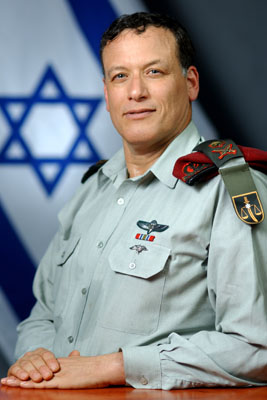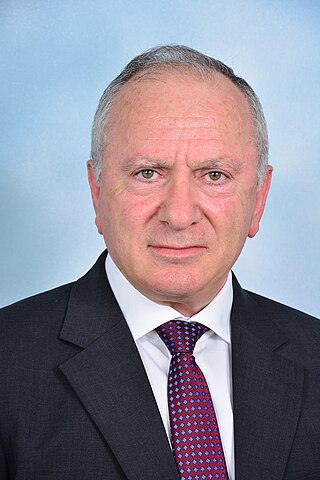
The 1st "Golani" Brigade is an Israeli military infantry brigade. It is subordinated to the 36th Division and traditionally associated with the Northern Command. It is one of the five infantry brigades of the regular Israel Defense Forces (IDF), the others being the Paratroopers Brigade, the Nahal Brigade, the Givati Brigade and the Kfir Brigade. Its symbol is a green olive tree against a yellow background, with its soldiers wearing a brown beret. It is one of the most highly decorated infantry units in the IDF. The brigade consists of five battalions, including two which it kept from its inception, one transferred from the Givati Brigade (51st).

Moshe Levi was an Israeli military commander and the 12th Chief of Staff of the Israel Defense Forces (IDF). He served in this position from 1983 to 1987, towards the end of the first Lebanon war and the establishment of the South Lebanon Security Belt.

Yitzhak Gershon is a retired Israeli Aluf and former commander of the Israel Defense Forces Home Front Command. He has served in various capacities within the Paratroopers Brigade, participating in notable operations such as Operation Litani and Operation Law and Order. Gershon also commanded the Judea and Samaria Division during the Second Intifada and oversaw the IDF's Operation Defensive Shield.

Gadi Eisenkot, also spelt Eizenkot, is an Israeli general and politician from the Israeli National Unity party. He served as the 21st Chief of Staff of the Israel Defense Forces from 2015 to 2019 and from 2023 to 2024, as a minister without portfolio in Israel's unity government. Eisenkot, who grew up in Eilat, pursued maritime studies and later served in the IDF's Golani Brigade. He holds a B.A. in History from Tel Aviv University and a post-graduate degree in Political Science from Haifa University. Married with five children, he resides in Herzliya. One of his sons, Gal, was killed in action during the Israel-Hamas war.

Yishai Beer is a former general in the Israel Defense Forces, head of a reserve call-up, and former president of the Israeli Military Court of Appeals. He is a professor of law at Reichman University.

The South Lebanon conflict was an armed conflict that took place in Israeli-occupied southern Lebanon from 1982 or 1985 until Israel's withdrawal in 2000. Hezbollah, along with other Shia Muslim and left-wing guerrillas, fought against Israel and its ally, the Catholic Christian-dominated South Lebanon Army (SLA). The SLA was supported militarily and logistically by the Israel Defense Forces and operated under the jurisdiction of the Israeli-backed South Lebanon provisional administration, which succeeded the earlier Israeli-backed Free Lebanon State. Israel officially names the conflict the Security Zone in Lebanon Campaign and deems it to have begun on 30 September 1982, after the end of its "Operation Peace for Galilee". It can also be seen as an extension of the Lebanese Civil War (1975–1990).

The Battle of Bint Jbeil was one of the main battles of the 2006 Lebanon War. Bint Jbeil is a major town of some 20,000 inhabitants in Southern Lebanon. Although Brigadier General Gal Hirsch announced on 25 July that the Israel Defense Forces (IDF) had "complete control" of Bint Jbeil, this statement was later discredited. In spite of three sustained attempts by the IDF to conquer the town, it remained in the hands of Hezbollah until the end of the war. The town was the scene of some of the fiercest fighting of the war, with both sides taking heavy losses. Three senior Israeli officers, including Major Roi Klein, were killed in the battle. Hezbollah similarly lost several commanders, most notably Khalid Bazzi, commander of the Bint Jbeil area.

The Battle of Maroun al-Ras was a battle of the 2006 Lebanon War that took place in Maroun al-Ras, a small village in southern Lebanon on the border with Israel, and Jall ad-Dayr, a nearby Hezbollah stronghold. This battle was the first serious ground battle in the 2006 Lebanon war. It was fought to a large extent by elite forces on both sides and would have huge consequences for the future of the war. Although Israeli forces captured most of the town, they did not fully secure it.

The 2006 Hezbollah cross-border raid was a cross-border attack carried out by Lebanon-based Hezbollah militants on an Israeli military patrol on 12 July 2006 on Israeli territory.
The Battle of Ayta ash-Sha'b took place during the 2006 Lebanon War, when the Israel Defense Forces and the Islamic Resistance, the armed wing of Hezbollah, fought over the town of Ayta ash-Sha'b in southern Lebanon. The fighting started with the 2006 Hezbollah cross-border raid. After a failed Israeli incursion immidiately after the cross-border raid, the town was subjected to two and a half weeks of intense bombardment by air and artillery. The ground battle for the Ayta ash-Sha'b lasted about two weeks, from late July to mid-August. The IDF deployed five brigades. The Hezbollah force in the town was estimated to consist of little more than half a company. Still the IDF failed to capture the town and suffered relatively heavy casualties in the process.
The Operation Change of Direction 11 was the final offensive operation by the Israel Defense Forces (IDF) during the 2006 Lebanon War that began on August 11, 2006, and ended three days later when the ceasefire came into effect. It involved a tripling of Israeli forces inside Lebanon and aimed at encircling Hizbullah forces in south Lebanon. The plan was to advance westwards along the Litani River from the Galilee Panhandle, combined with helicopter landings behind enemy lines, intended to be the largest in IDF history, and simultaneous advances northwards in the central sector and along the Mediterranean coast. The plan was to follow up the offensive by several weeks of mopping-up operations in the surrounded territories, eliminating Hizbullah infrastructure, especially in the launching areas of Katyusha rockets.

Uri Sagi is an Israeli retired general who held several prominent posts including commander of the Golani Brigade and chief of the IDF's Military Intelligence Directorate.

Yoav "Poli" Mordechai is a retired major general in the Israel Defense Forces.

The Hannibal Directive, also translated as Hannibal Procedure or Hannibal Protocol, is the name of a controversial procedure used by Israel Defense Forces (IDF) to prevent the capture of Israeli soldiers by enemy forces. According to one version, it says that "the kidnapping must be stopped by all means, even at the price of striking and harming our own forces." It was introduced in 1986, after a number of abductions of IDF soldiers in Lebanon and subsequent controversial prisoner exchanges. The full text of the directive was never published, and until 2003, Israeli military censorship forbade any discussion of the subject in the press. The directive has been changed several times, and in 2016 Gadi Eizenkot ordered the formal revocation of the standing directive and the reformulation of the protocol.

Amir Baram is an Israel Defense Forces major general (Aluf) who currently serves as the Deputy Chief of General Staff. He previously served as the commander of the Northern Command, commander of the IDF Military Colleges, commander of the 91st Division, commander of 98th Paratroopers Division and commander of the Paratroopers Brigade.

Gal Hirsch is an Israeli former military commander and author. As Brigadier General, he commanded the 91st Division of Israel Defense Forces (IDF) during the 2006 Lebanon War.

Moshe "Chiko" Tamir is an Israeli brigadier general who commanded the Gaza Division of the Israel Defense Forces.

Itzhak Ilan or Yitzhak Ilan, served in the Israel Security Agency during the years 1982–2012, and served during his last position as the Deputy Director of the ISA during the years 2010–2011.

Tamir Yadai is an Israeli major general (aluf) who commands the Ground Forces Command of the Israel Defense Forces (IDF).

Roi Yosef Levy was an officer in the Israel Defense Forces (IDF) with the rank of colonel who served in his last position as commander of the Multidimensional Unit. He had previously served as commander of the Fire Training Center in Melah, commander of the Bar'am Brigade, commander of the Unit 621 - 'Egoz', commander of the Hadar Battalion and commander of the 1st 'Golani' Brigade. He was killed in the battle of Re'im during an encounter with Palestinian militants during the Israel–Hamas war.

















